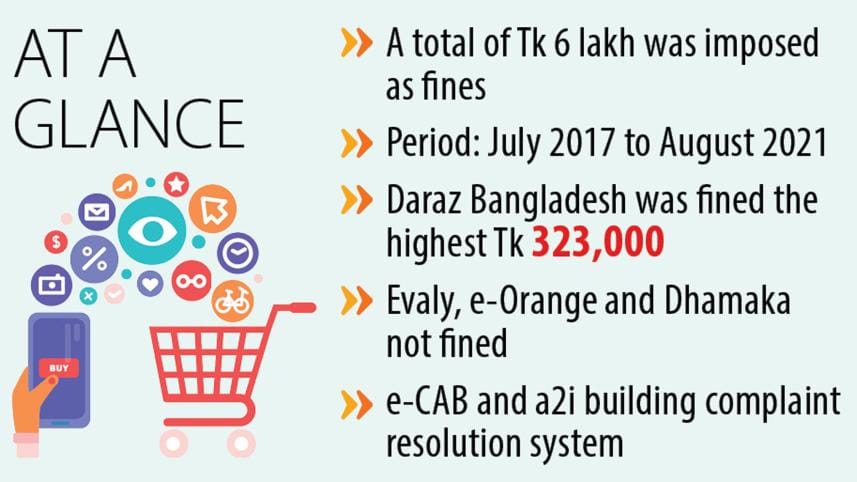17 e-commerce firms fined

The consumer rights watchdog of Bangladesh has fined 17 e-commerce firms for their failure to deliver products as promised and deceiving customers through false advertisements.
The Directorate of National Consumer Rights Protection (DNCRP) imposed a combined fine of around Tk 6 lakh on the platforms.
The firms are Daraz Bangladesh, Ajkerdeal, Daily Shopping, Othoba, Shohoz, Picaboo, Rokomari, BoiBazar, BDSHOP, Gharbazar, PriyoShop, Bikroy, Foodpanda, Pathao, Chaldal, Falguni Shop, and Kiksha.
A DNCRP official said the e-commerce firms were fined for violating consumers' right protection laws for the period from July 2017 to August 2021.
The offences include not handing over products as promised, not showing price list, not using cover of goods, and deceiving buyers with false advertisements.
Daraz Bangladesh, a popular e-commerce company, was fined the highest Tk 323,000.
Shohoz was fined Tk 68,000, AjkerDeal Tk 45,000, Chaldal Tk 25,000, Foodpanda Tk 15,000, and Pathao Tk 9,000.
Hasinul Quddus, chief corporate affairs officer of Daraz Bangladesh, said the DNCRP imposed two major fines against Daraz in 2018.
Daraz has filed a writ petition against the decision of the DNCRP, and the matter is now pending with the High Court, he said.
Maliha M Quadir, managing director of Shohoz, said: "We are awaiting the DNCRP's revert on the eight unresolved cases published recently."
"However, of the 85 cases over the last four years, we won the vast majority of them and paid fines for a handful of cases. These were solely due to the service quality of offline third-party vendors, over which we have no control."
AKM Fahim Mashroor, CEO of AjkerDeal, said: "If you provide a service, something could always go wrong."
Zia Ashraf, chief operating officer of Chaldal, said if consumers made any complain, the company tried to solve it with utmost importance.
"Sometimes we do not get the time required to sort out a problem."
In a statement, Foodpanda said: "We immediately address any issue our customers face and try to resolve their complaints as fast as possible."
"However, sometimes customers reach out to the DNCRP with their complaints, and the issues are then resolved as per DNCRP's procedures."
Bablu Kumar Saha, director-general of the DNCRP, said of the 17 e-commerce firms, 90 per cent were fined for not selling or delivering goods or services properly.
He said the number of e-commerce firms facing fines had started rising from early 2020. "Consumers have to be more careful."
EVALY, E-ORANGE AND DHAMAKA NOT FINED
Despite being the most talked e-commerce firms, Evaly, E-orange and Dhamaka Shopping did not face any fines.
So far, 7,138 complaints have been filed with the DNCRP against Evaly with a settlement rate of about 63 per cent.
E-orange has seen 2,643 complaints with a settlement rate of 1.25 per cent. In addition, 323 complaints were lodged against Dhamaka Shopping with a settlement rate of about 18 per cent.
At present, the owners and top officials of Evaly, E-orange and Dhamaka are in jail in connection with fraud and money laundering cases.
When asked why the three firms were not fined, Saha said consumers ordered products in large volumes. But the DNCRP can impose a maximum fine of Tk 50,000, jail the offenders for a maximum of one year, or impose both.
"The penalty will give a consumer Tk 12,500. As a result, they will face a huge loss," Saha said.
Consumers Association of Bangladesh President Ghulam Rahman feels that there are some limitations in the law.
"But the firms that have deceived many people in the same manner should be severely punished. Large scale fines should be imposed."
Abdul Wahed Tamal, general secretary of the e-Commerce Association of Bangladesh (e-Cab), says big companies deal with millions of customers, so there will be some allegations against them.
He says the e-Cab and the Access to Information Programme of the Prime Minister's Office are building a digital system that will automatically receive and settle customer grievances.
The Central Complaint Management System will connect customers to e-commerce platforms, the commerce ministry, the e-Cab and the DNCRP. Complaints that are not immediately addressed by an e-commerce platform will be automatically sent to the relevant government agencies.
There are about 2,500 e-commerce platforms and 2.5 lakh Facebook-based sites in Bangladesh.




 For all latest news, follow The Daily Star's Google News channel.
For all latest news, follow The Daily Star's Google News channel.
Comments